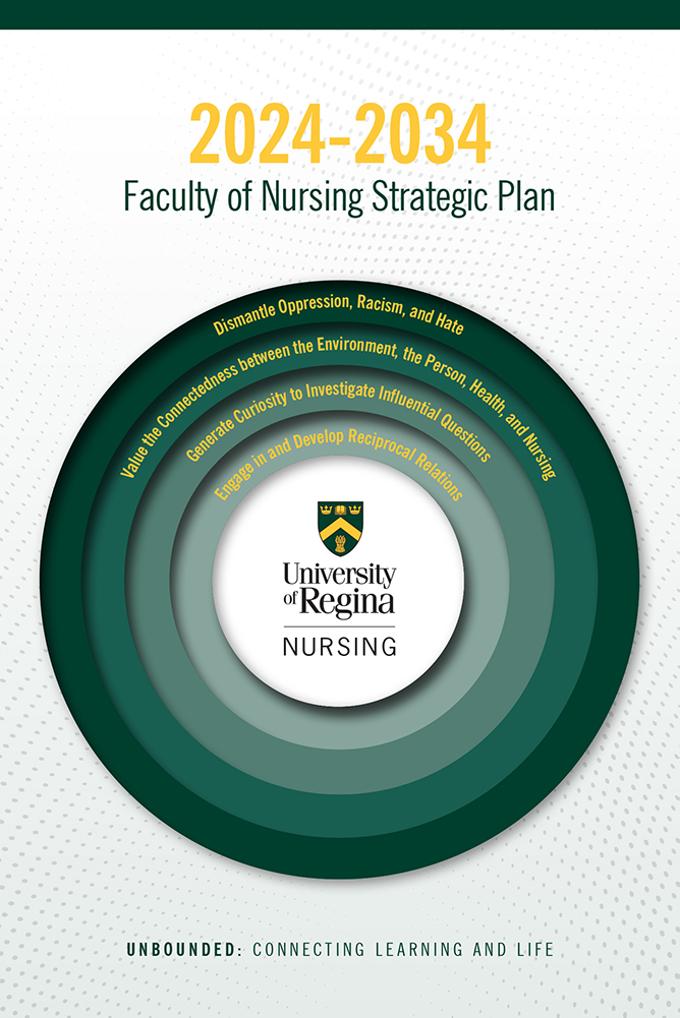New Strategic Plan 2024-2034
Our Primary Intentions Set the Stage for the Next Ten Years
The Faculty of Nursing’s newly-minted 2024-2034 Strategic Plan Unbounded: Connecting Learning and Life will bring previous strategic visions to life and guide the next era of nursing education and research excellence.

“Through creating a community where we all truly belong and feel welcome, opportunities will be available for students, faculty and staff to thrive,” said Pollard. ”This 10-year Strategic Plan recognizes that short-term goals and objectives may be adjusted and changed. However, our Primary Intentions are enduring, as we create opportunities for relationship building, collectivity, reciprocity, truth and reconciliation, transforming relationships and creating opportunities for stronger connections between the environment, the person, health and nursing.”
“We know that a 10-year plan is ambitious and will require careful integration of emerging University of Regina initiatives and future plans,” said Faculty of Nursing Dean Cheryl Pollard. “But we believe the challenges facing nursing education require a longer-term approach to solutions.”
The Faculty of Nursing Strategic Plan was built on a planning process created by the University of Regina’s 2021-2025 Strategic Plan: All Our Relations: kahkiyaw kiwâhkômâkaninawak, which describes the University’s foundational commitment to respect each other in thought, word, and deed.
The Faculty of Nursing Strategic Plan emerged from reflections in 2021 on ways of being, connecting, knowing and doing. From those thoughts and discussions, through the efforts of many students, staff, faculty and alumni, there emerged a reimagined direction, built on the foundation created by the Faculty’s founding leaders. With the complex, multi-dimensional and layered challenges facing nursing and healthcare today, the Strategic Plan is designed as a thoughtful, longer-term approach needed to build solid solutions to these complex challenges.
“We believe in the importance of honouring who we are, where we are, where we have been, and where we are going. We have reaffirmed our beliefs that strength, wisdom and courage lie within our relationships and in our interconnectedness,” said Pollard.
The Faculty of Nursing’s strategic priorities, called Primary Intentions, will provide the roadmap for moving the Faculty forward in a respectful, inclusive and intentional way over the next ten years. Primary Intentions truly embodies the spirit and passion of nursing students – who when asked to define “What does a nurse mean to you?” describe their journey into healthcare with words such as compassionate, competent, empathetic, collaborative, resilient, being part of change, saving lives, advocating, providing safety and support, helping those in need and impacting lives.
The Primary Intentions
Engage in and Develop Reciprocal Relations
The Faculty is committed to better understanding the impact it has on its relationship with students, community, staff and faculty. It will monitor the pace at which undergraduate students return to complete graduate programming, with alumni who support learning as preceptors or donating their time or financial resources for faculty initiatives, surveys, and community events.
Generate Curiosity to Investigate Influential Questions
As an institution of higher learning, the University of Regina fosters leadership in thought among its community of students and academics. The Faculty is committed to this leadership philosophy and will continue to support grant applications, quality improvement projects, and research into curriculum and classroom teaching to promote the scholarship of teaching and learning. It will monitor the number of Graduate Certificates, support the Master of Nursing and PhD in Nursing programs, and scholarship and creative activities.
The 2024-2034 Strategic Plan will build on the nursing foundation created by the University of Regina’s Faculty of Nursing over the past 15 years, which first introduced nursing education in 2011 with the undergraduate Saskatchewan Collaborative Bachelor of Science in Nursing program, SCBScN, developed jointly with Saskatchewan Polytechnic. Since that time, significant milestones include the development of graduate nursing education programs, notably the Collaborative Nurse Practitioner Program in 2014, and the Graduate Certificate in Nursing Education (GCNE), Graduate Certificate in Nursing Leadership (GCNL), and Master of Nursing (MN) programs in 2023.
“Through creating a community where we all truly belong and feel welcome, opportunities will be available for students, faculty and staff to thrive,” said Pollard. ”This 10-year Strategic Plan recognizes that short-term goals and objectives may be adjusted and changed. However, our Primary Intentions are enduring, as we create opportunities for relationship building, collectivity, reciprocity, truthing and reconciliation, transforming relationships and creating opportunities for stronger connections between the environment, the person, health and nursing.”
Value the Connectedness between the Environment, the Person, Health, and Nursing
Nursing embodies the principle that interdependent relations among the environment, human, health, and nursing form the basis for action that constitutes holistic care. Outcome measures such as community partnerships, sustainability-focused projects, and student placements within Indigenous communities will strengthen the relationships between these pillars of healthcare.
Dismantle Oppression, Racism, and Hate
This goal, inherent to the Faculty’s commitment to improving educational and nursing practices through equity, diversity, inclusivity, anti-racism, reconciliatory, and decolonization practices in teaching, research, and administrative activities, will redress historical wrongs and ensure that past colonial practices in post-secondary institutions are not perpetuated.
Success will be measured through student engagement surveys, professional development activities, integration of EDI principles into syllabi and assignments, stewardship, and enhanced opportunities for prospective equity learners.
The feather and Métis sash hold profound cultural, spiritual, and historical significance within Indigenous communities and serve as symbols that connect individuals to their heritage and values cherished within their cultures. The Faculty of Nursing offers each Indigenous graduate a gift of either an Eagle Feather or a Métis sash to celebrate their accomplishments and acknowledge that the nursing community is on a healing journey together.